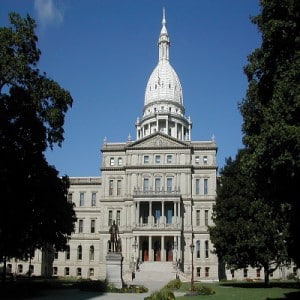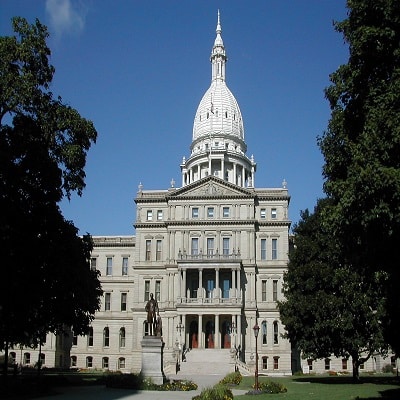 A yer and a half ago the Michigan House of Representatives passed the Provisioning Centers Act and the associated Smoking Alternatives Bills by near-unanimous consent. They were not voted on before the 2013-14 session expired and were reintroduced this year. On Tuesday a new version of those bills will be presented to the House Judiciary Committee that look almost nothing like the proposals that had the support of the medical marijuana community.
A yer and a half ago the Michigan House of Representatives passed the Provisioning Centers Act and the associated Smoking Alternatives Bills by near-unanimous consent. They were not voted on before the 2013-14 session expired and were reintroduced this year. On Tuesday a new version of those bills will be presented to the House Judiciary Committee that look almost nothing like the proposals that had the support of the medical marijuana community.
Although there exists no public copies of the newest drafts of HB 4209 and HB 4210, some things are known. These bills will not allow caregivers to sell their overages to a dispensary. Any cannabis sold to any dispensary, called Provisioning Centers, will have to be intentionally created for commercial distribution in licensed commercial grow operations of from 500 – 1,500 plants, the rumors say, with the exception of a caregiver selling to their five patients and ONLY their five patients.
Some of these issues were discussed on the Planet Green Trees Radio Show, on an episode featuring Robin Schneider of the National Patients Rights Association. The NPRA has been moderating the decline of the bills as best they can, but newcomers in the game of lobbying legislators have diverted the intent from being a patient-friendly bill to one that unzips the pants of big business.
“This could be the end of the caregiver system as we know it,” Jim Powers noted on that episode of the Planet Green Trees Radio Show. Powers has haunted the House and Senate chambers for two years, pushing the lawmakers to enact legislation to protect the non-smoked forms of cannabis used by his son Ryan and other pediatric cannabis patients across the state. That bill – HB 4210- is tied to the fate of the Provisioning Centers Act.
Our two old friends- the Provisioning Centers Act was originated in 2011, the Smoking Alternatives bill in 2013- have a new invisible friend to play with, HB 4827, the Seed to Sale Bill.
It’s The Invisible Bill because it has been assigned a bill number, is already listed as being considered by the House Judiciary, but there is no mention of the bill anywhere on the Michigan government websites. No text, no sponsors listed, no introductory date, nothing.
We do know what the playmate is all about, though. The House Judiciary Committee meeting notice offers a description of HB 4827: “Marihuana; administration; seed-to-sale tracking system for commercial marihuana; establish.” We also know who sponsored the bill.
That would be the Chair of the House Judiciary Committee himself, Oakland County Republican Rep. Klint Kesto, who is rumored to be eyeing a run at Bill Schuette’s spot as Attorney General in 2018.
We also know he must have been pretty impressed with the out-of-state company called MJ Freeway, who are giving a presentation during Tuesday’s Judiciary Committee meeting on their specific seed-to-sale program, which the State of Michigan would have to buy from them. Their website offers programs called “Gramtracker”, Mixtracker”, and “Growtracker”. Kesto must have been so impressed with their sales pitch that he drafted a bill to adopt their program.
Hell, we haven’t seen this degree of- let’s politely call it ‘encouraged legislative support for a specific commercial interest’- since Randy Richardville and the SB 660 Prairie Plant, pot-for-pharmacies bill in 2013. That bill shot through both the House and Senate- and was signed by the Governor- within three months.
Prairie Plant is a Canadian company. MJ Freeway is a Colorado group. When will these guys start following Governor Snyder’s Pure Michigan theme and shop close to home?
MJ is not without her set of problems. In November of 2014 MJ Biz Daily reported that MJ Freeway left users of the system “screwed” and individual dispensaries using the system “lost $25,000 in revenue on Thursday alone” due to a failure in the company’s software upgrade, per MJ customer’s quotes. That problem has been solved, per an update to the Business Daily story, but should give lawmakers reason to pause.
This is the official notice from the House Judiciary Committee:
Standing Committee Meeting
Judiciary, Rep. Klint Kesto, Chair
DATE: Tuesday, August 18, 2015
TIME: 9:00 AM
PLACE: Room 521, House Office Building, Lansing, MI
AGENDA:
PRESENTATION BY:MJ Freeway Business Solutions on marihuana tracking.
TESTIMONY ONLY:
HB 4209 (Rep. Callton) Health; medical marihuana; state and local regulation of marihuana provisioning centers; provide for.
HB 4210 (Rep. Lyons) Health; medical marihuana; marihuana-infused products; allow and regulate.
TESTIMONY ONLY ON LEGISLATION PENDING INTRODUCTION AND REFERRAL:
HB 4827 (Rep. Kesto) Marihuana; administration; seed-to-sale tracking system for commercial marihuana; establish.
OR ANY BUSINESS PROPERLY BEFORE THIS COMMITTEE
To view text of legislation go to:
www.legislature.mi.gov/mileg.aspx?page= CommitteeBillRecord Committee Clerk: Melissa Weipert
Phone: 517-373-5176
e-Mail: [email protected]
The versions of HB 4209 and HB 4210 that were modified and compromised through the 2013-14 legislative session, and were one step away from becoming law, are still on the Michigan government website. You can print them and evaluate the changes presented on Tuesday. That is, provided Rep. Michael Callton (R-Nashville) ensures that the newest draft of HB 4209 that his office has authorized for debate by the Judiciary is available for citizens to read.
Rep. Kesto’s contact information:
PHONE: 517-373-1799
EMAIL: [email protected]
Rep. Callton’s contact informaion:
PHONE: 517-373-0842
EMAIL: [email protected]




